The Chipko movement is a forest conservation movement in India. Opposed to commercial logging and the government's policies on deforestation, protestors in the 1970s engaged in tree hugging, wrapping their arms around trees so that they could not be felled.
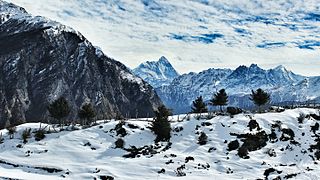
Uttarakhand, also known as Uttaranchal, is a state in northern India. It is often referred to as the "Devbhumi" due to its religious significance and numerous Hindu temples and pilgrimage centres found throughout the state. Uttarakhand is known for the natural environment of the Himalayas, the Bhabar and the Terai regions. It borders the Tibet Autonomous Region of China to the north; the Sudurpashchim Province of Nepal to the east; the Indian states of Uttar Pradesh to the south and Himachal Pradesh to the west and north-west. The state is divided into two divisions, Garhwal and Kumaon, with a total of 13 districts. The winter capital of Uttarakhand is Dehradun, the largest city of the state, which is a rail head. Gairsain, a town in Chamoli district, is the summer capital of Uttarakhand declared on 5 March 2020. The High Court of the state is located in Nainital, but is to be moved to Haldwani in future.

The Uttarakhand Kranti Dal, is a registered unrecognised regional political party in Uttarakhand, India. It bills itself as the only regional party of the Uttarakhand in contrast to the national parties that dominate the state's politics.

Kumaoni is an Indo-Aryan language spoken by over two million people of the Kumaon region of the state of Uttarakhand in northern India and parts of Doti region in Western Nepal. As per 1961 survey there were 1,030,254 Kumaoni speakers in India. The number of speakers increased to 2.2 million in 2011.
Gairsain is a town in Chamoli district of the Indian state of Uttarakhand near state's summer capital Bhararisain. A town and Nagar Panchayat, Gairsain is situated at the eastern edge of the vast Dudhatoli mountain range, and is located in Chamoli district almost at the centre of the state, at a distance of approximately 250 kilometres from Dehradun. It is easily accessible from both the Garhwal and the Kumaon divisions, and in a way, acts as the bridge between the two regions. It is being considered as the future Permanent capital of Uttarakhand.

Bipin Chandra Tripathi was a founder member of the Uttarakhand Kranti Dal, a political party recognised in the Indian state of Uttarakhand.
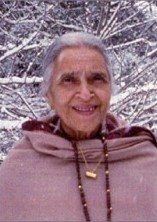
Gaura Pant, better known as Shivani, was a Hindi writer of the 20th century and a pioneer in writing Indian women-centric fiction. She was awarded the Padma Shri for her contribution to Hindi literature in 1982.

Nainital district is a district in Kumaon division which is a part of Uttarakhand state in India. The headquarters is at Nainital.

Almora is a municipal board and a cantonment town in the state of Uttarakhand, India. It is the administrative headquarters of Almora district. Almora is located on a ridge at the southern edge of the Kumaon Hills of the Himalaya range. The Koshi (Kaushiki) and Suyal (Salmale) rivers flow along the city and snow-capped Himalayas can be seen in the background.
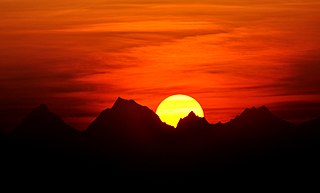
Kausani is a hill station and Village situated in Bageshwar district in the state of Uttarakhand, India. It is famous for its scenic splendour and its spectacular 300 km-wide panoramic view of Himalayan peaks like Trisul, Nanda Devi and Panchchuli. Mahatma Gandhi called this place the 'Switzerland of India', due to similarity in landscapes.
Pant or Panta is a last name, commonly found in Nepal and in the Indian states of Uttarakhand and Maharashtra. It is a traditional surname used by Brahmins, a priestly community. Foremostly involved in the activities of the state, they were generally found involved in activities such as academics, religion, management, politics and warfare.

Dr. Shekhar Pathak is a historian, editor, publisher, activist, and traveller from Uttarakhand, India. He is known for his extensive knowledge of the history of colonial and postcolonial social movements and contemporary environmental and social issues in Uttarakhand, and colonial exploration in the Himalayas and Tibet. He has also been engaged in activism for various social and environmental causes since the 1970s.
Kashi Singh Airy is the leader and founding member of Uttarakhand Kranti Dal and a former member of the Uttar Pradesh Legislative Assembly and Uttarakhand Legislative Assembly. He founded the party in 1979 along with Bipin Chandra Tripathi, D. D. Pant and Indramani Badoni.
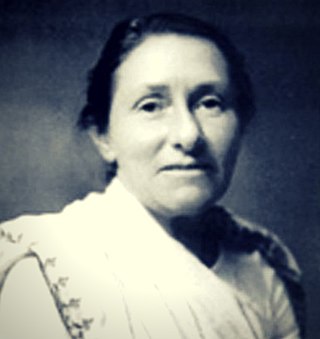
Sarala Behn was an English Gandhian social activist whose work in the Kumaon region of India helped create awareness about the environmental destruction in the Himalayan forests of the state. She played a key role in the evolution of the Chipko Movement and influenced a number of Gandhian environmentalists in India including Chandi Prasad Bhatt, Bimala behn and Sunderlal Bahuguna. Along with Mirabehn, she is known as one of Mahatma Gandhi's two English daughters. The two women's work in Garhwal and Kumaon, respectively, played a key role in bringing focus on issues of environmental degradation and conservation in independent India.
The Uttarakhand movement refers to the events of statehood activism within the undivided state of Uttar Pradesh which ultimately resulted in the formation of Uttarakhand, India as a separate state. Uttarakhand became a state on 9 November 2000. The formation of Uttarakhand was achieved after a long struggle and many sacrifices. The demand to make Uttarakhand a state was first raised at a special session of the Indian National Congress held in Srinagar on 5-6 May 1938. The demand gradually strengthened following a series of events. In 1994, the demand for a separate state eventually took the form of a mass movement that resulted in the formation of India's 27th state by 2000. Jeet Bahadur Gurung became the first martyr in Pauri on 8 August 1994.
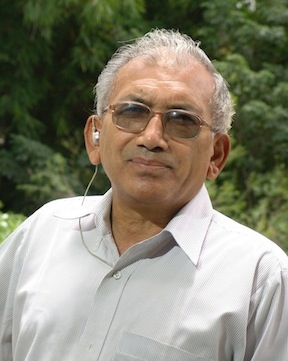
Khadg Singh (KS) Valdiya was an Indian geologist and a former vice chancellor of Kumaon University, known for his contributions in the field of geodynamics. A 2007 recipient of Padma Shri, he was honoured again by the Government of India in 2015 with Padma Bhushan, the third highest Indian civilian award.

Sarita Arya is the sitting and second time elected M.L.A. from 58 Legislative Assembly seat of lake city Nainital in the state of Uttarakhand. She was elected for the first term in the year 2012 from Indian National Congress and held the elected post till 2017. She won her second term from the same constituency in the 2022 state polls contesting from the Bhartiya Janta Party.
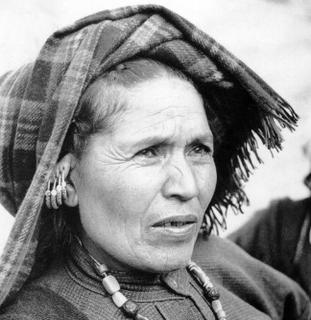
Gaura Devi was a grassroots activist and a rural women community leader from India who played an important role in the Chipko movement.













